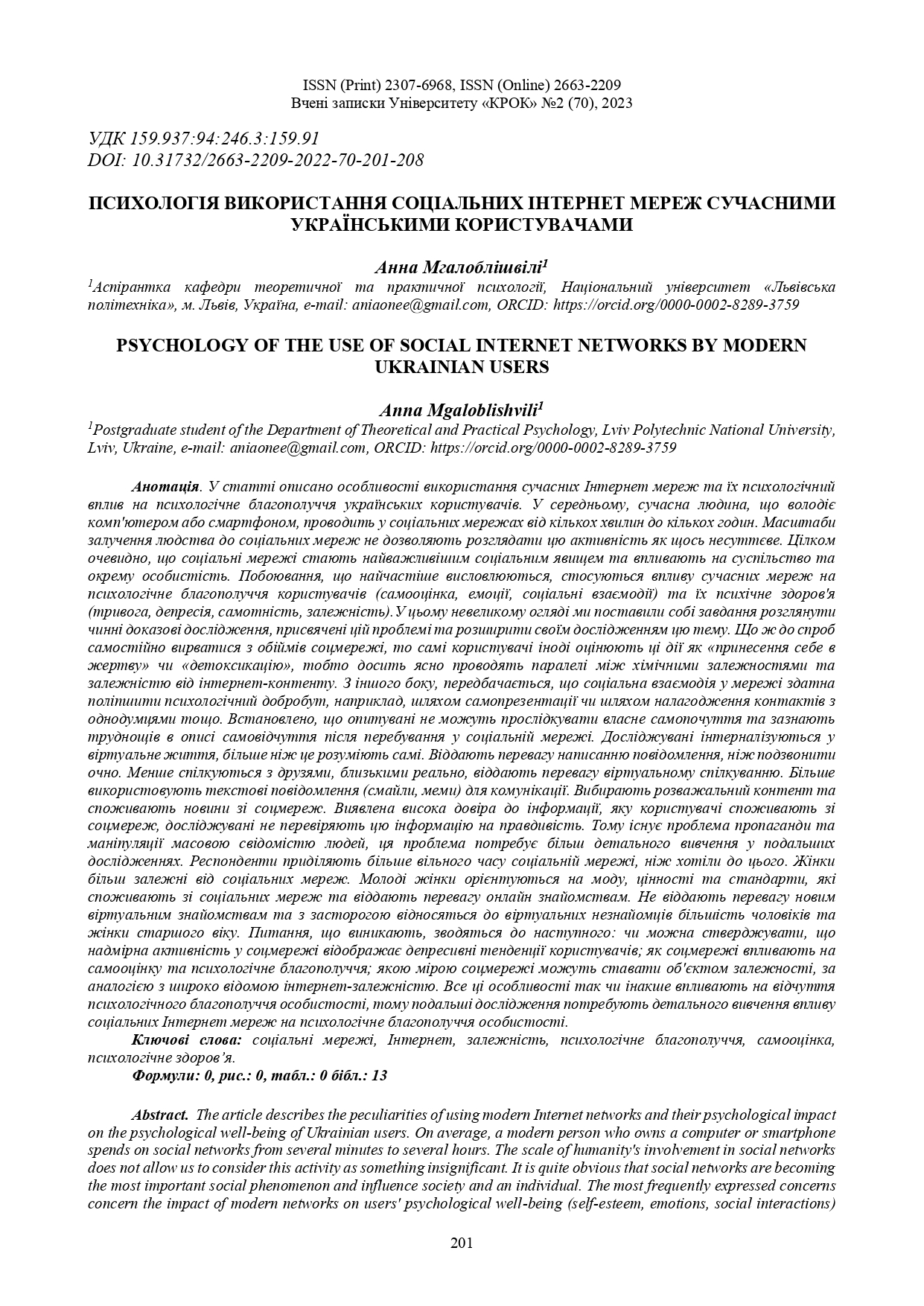PSYCHOLOGY OF THE USE OF SOCIAL INTERNET NETWORKS BY MODERN UKRAINIAN USERS
DOI:
https://doi.org/10.31732/2663-2209-2022-70-201-208Keywords:
social networks, Internet, addiction, psychological well-being, self-esteem, psychological healthAbstract
The article describes the peculiarities of using modern Internet networks and their psychological impact on the psychological well-being of Ukrainian users. On average, a modern person who owns a computer or smartphone spends on social networks from several minutes to several hours. The scale of humanity's involvement in social networks does not allow us to consider this activity as something insignificant. It is quite obvious that social networks are becoming the most important social phenomenon and influence society and an individual. The most frequently expressed concerns concern the impact of modern networks on users' psychological well-being (self-esteem, emotions, social interactions) and their mental health (anxiety, depression, loneliness, addiction). In this small review, we set out to consider the existing research evidence, dedicated to this problem and expand their research on this topic. As for attempts to independently escape from the embrace of the social network, users themselves sometimes evaluate these actions as "self-sacrifice" or "detoxification", i.e. quite clearly draw parallels between chemical addictions and Internet content addiction. On the other hand, it is assumed that social interaction in the network can improve psychological well-being, for example, through self-presentation or through establishing contacts with like-minded people, etc. It was established that the interviewees cannot monitor their own well-being and experience difficulties in describing their well-being after being in a social network. Subjects are internalized into virtual life, more than they realize. They prefer to write a message than to call in person. They communicate less with real friends, they prefer virtual communication. Text messages (emoticons, memes) are used more for communication. They choose entertainment content and consume news from social networks. A high level of trust in the information that users consume from social networks is revealed, it is worth noting that the respondents do not check this information for reliability. Therefore, there is a problem of propaganda and manipulation on the mass consciousness of people, this problem requires a more detailed study in further research. Respondents spend more free time on social networks than they wanted. Women are more dependent on social networks. Young women are guided by fashion, values and standards that they consume from social networks and prefer online dating. They do not prefer new virtual acquaintances, more older men and women are wary of virtual strangers. The questions that arise are reduced to the following: can it be argued that excessive activity in the social network reflects depressive tendencies of users; how social networks affect self-esteem and psychological well-being; to what extent social networks can become an object of addiction, by analogy with the well-known Internet addiction. All these features in one way or another affect the feeling of psychological well-being of an individual, so further research requires a detailed study of the influence of social Internet networks on the psychological well-being of an individual.
Downloads
References
Kaur, R. & Bashir, H. Impact of Social Media on Mental Health of Adolescents. International Journal of Education,. 2015. 5. P. 22–29.
Pryzbylski, A. Murayama, K. DeHaan, C. Gladwell, V. 2013. Motivational, emotional and behavioural correlates of fear of missing out. Computers in Human Behaviour. Volume 29. Issue 4. 2013, P. 1841–1848.
Fardouly J., Willburger B. K., & Vartanian L. R. Instagram use and young women’s body image concerns and self-objectification: Testing mediational pathways. New Media & Society. 2018. 20(4). P. 1380–1395.
Chou H.T., Edge N. “They are happier and having better lives than I am”: the impact of using Facebook on perceptions of others’ lives. Cyberpsychology, Behavior, and Social Networking. 2012.Vol. 15. P. 117–121.
C.S. Andreassen, T. Torsheim, G.S. Brunborg. Development of a Facebook Addiction Scale. Psychological Reports. 2012. Vol. 110. P. 501–517.
R. Kraut, M. Patterson, V. Lundmark. Internet paradox. A social technology that reduces social involvement and psychological well-being? The American Psychologist. 1998. Vol. 53. P. 1017–1031.
Jelenchick L.A., Eickhoff J.C., Moreno M.A. «Facebook depression?» social networking site use and depression in older adolescents. J. Adolesc. Health. 2013. Vol. 52(1). P. 128–130.
Lee-Won R.J., Herzog L., Park S.G. Hooked in Facebook: the role of social anxiety and need for social assurance in problematic use of Facebook. Cyberpsychology, Behavior, and Social Networking. 2015. Vol. 18. P. 1–8.
Mehdizadeh S. Self-presentation 2.0: narcissism and self-esteem on Facebook. Cyberpsychology, Behavior, and Social Networking. 2010. Vol. 13. P. 357–364.
O’Keeffe G.S., Clarke-Pearson K. The impact of social media on children, adolescents, and families. Pediatrics. 2011. Vol. 127(4). P. 800–804.
Orth U., Robins R.W., Roberts B.W. Low self-esteem prospectively predicts depression in adolescence and young adulthood. Journal of Personality and Social Psychology.2008.Vol. 95.P. 695–708.
Pantic I. Online Social Networking and Mental Health. Cyberpsychology, Behavior, and Social Networking. 2014. Vol. 17(10). P. 652–657.
Колеснікова Т.В., Сингаївська І.В. Психологічні передумови формування іміджу сучасної жінки в соціальних мережах. Держава, регіони, підприємництво: інформаційні, суспільно-правові, соціально-економічні аспекти розвитку: тези доповідей ІІ Міжнародної конференції (Київ, 20 листопада 2020 р.). К.: Університет "КРОК", 2020. С. 44–46.

Downloads
Published
How to Cite
Issue
Section
License

This work is licensed under a Creative Commons Attribution-NonCommercial 4.0 International License.

